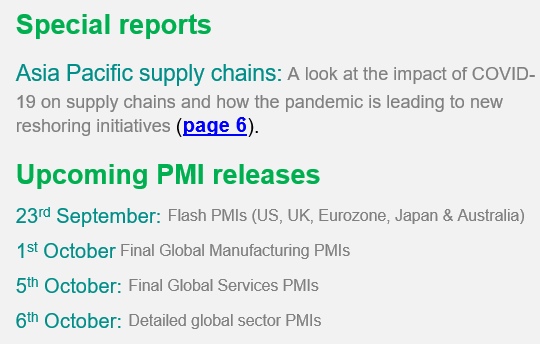Customer Logins
Obtain the data you need to make the most informed decisions by accessing our extensive portfolio of information, analytics, and expertise. Sign in to the product or service center of your choice.
Customer Logins
ECONOMICS COMMENTARY
Sep 11, 2020
Week Ahead Economic Preview: Week of 14 September 2020
The following is an extract from IHS Markit's latest Week Ahead Economic Preview. For the full report (including Special Reports) please click on the link at the bottom of the article.
- US, UK and Japan monetary policy meetings
- Industrial production data for the US, China and eurozone, plus key trade data updates
- Retail sales release in the US and China
The coming week sees monetary policy meetings at the Federal Reserve, Bank of England and Bank of Japan, all of which are struggling to gauge the shape of economic recoveries from COVID-19 lockdowns. The latest business surveys indicated a further rebound of global business activity in August but also raised concerns about the resilience of national upturns given worries over fresh waves of infections. The meetings will be especially important in assessing the degree to which policymakers are prepared to tolerate higher price pressures in order to sustain recoveries.
At the recent Jackson Hole symposium, US Fed chair Powell already announced a new framework which allows an overshoot of the inflation target to help ensure a robust recovery. The FOMC's latest decision will be framed by updates to key indicators of economic health in August in the form of retail sales and industrial production. Both have seen growth rates fade from initial rebounds in recent months, so policymakers will be eager to see signs of sustained expansion. The US also publishes updated trade data, the deficit of which has recently ballooned to the highest since the global financial crisis (page 3).
In the UK, growth surged in August according to the PMI surveys but many of the Bank of England's rate setters are likely to be concerned by the labour market: the surveys also showed the rate of job losses accelerating in August and the government's furlough scheme is ending in October. Unemployment therefore looks set to rise sharply which, alongside renewed lockdown measures, adds to the risk of the recovery fading sharply. Eurozone watchers will meanwhile eye trade and production data (page 4).
In Asia Pacific, no major change in policy is expected in Japan, though markets will be eager to assess the Bank of Japan's view of the strength of the upturn. News of Shinzo Abe's replacement will also be eagerly awaited. Meanwhile, China watchers will seek confirmation of recent survey data, showing China's economic recovery sustaining robust momentum, from fixed asset investment, industrial production, retail sales and employment numbers (page 5).
Contact us
PMI commentary: Chris Williamson
Europe commentary: Ken Wattret
APAC commentary: Rajiv Biswas and Bernard Aw
© 2020, IHS Markit Inc. All rights reserved. Reproduction in whole
or in part without permission is prohibited.
Purchasing Managers' Index™ (PMI™) data are compiled by IHS Markit for more than 40 economies worldwide. The monthly data are derived from surveys of senior executives at private sector companies, and are available only via subscription. The PMI dataset features a headline number, which indicates the overall health of an economy, and sub-indices, which provide insights into other key economic drivers such as GDP, inflation, exports, capacity utilization, employment and inventories. The PMI data are used by financial and corporate professionals to better understand where economies and markets are headed, and to uncover opportunities.
This article was published by S&P Global Market Intelligence and not by S&P Global Ratings, which is a separately managed division of S&P Global.
{"items" : [
{"name":"share","enabled":true,"desc":"<strong>Share</strong>","mobdesc":"Share","options":[ {"name":"facebook","url":"https://www.facebook.com/sharer.php?u=http%3a%2f%2fprod.azure.ihsmarkit.com%2fmarketintelligence%2fen%2fmi%2fresearch-analysis%2fweek-ahead-economic-preview-week-of-14-september-2020.html","enabled":true},{"name":"twitter","url":"https://twitter.com/intent/tweet?url=http%3a%2f%2fprod.azure.ihsmarkit.com%2fmarketintelligence%2fen%2fmi%2fresearch-analysis%2fweek-ahead-economic-preview-week-of-14-september-2020.html&text=Week+Ahead+Economic+Preview%3a+Week+of+14+September+2020+%7c+S%26P+Global+","enabled":true},{"name":"linkedin","url":"https://www.linkedin.com/sharing/share-offsite/?url=http%3a%2f%2fprod.azure.ihsmarkit.com%2fmarketintelligence%2fen%2fmi%2fresearch-analysis%2fweek-ahead-economic-preview-week-of-14-september-2020.html","enabled":true},{"name":"email","url":"?subject=Week Ahead Economic Preview: Week of 14 September 2020 | S&P Global &body=http%3a%2f%2fprod.azure.ihsmarkit.com%2fmarketintelligence%2fen%2fmi%2fresearch-analysis%2fweek-ahead-economic-preview-week-of-14-september-2020.html","enabled":true},{"name":"whatsapp","url":"https://api.whatsapp.com/send?text=Week+Ahead+Economic+Preview%3a+Week+of+14+September+2020+%7c+S%26P+Global+ http%3a%2f%2fprod.azure.ihsmarkit.com%2fmarketintelligence%2fen%2fmi%2fresearch-analysis%2fweek-ahead-economic-preview-week-of-14-september-2020.html","enabled":true}]}, {"name":"rtt","enabled":true,"mobdesc":"Top"}
]}









